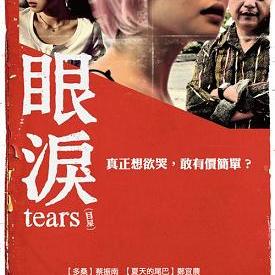An ageing detective stares retirement in the face, but he's not about to go quietly. He heaps scorn on the naivete his juniors display (he even waterboards one to demonstrate how pointless torture is); he chases petty criminals and young thugs even when it gets him no tangible reward; he looks out for the everyman, like a pair of betelnut beauties in their kiosks by the side of the highway, and he refuses to try and patch up his failed marriage no matter how insistently his offspring pester him.
Why? That's the point, basically. Cheng Wen-Tang's gritty DV police procedural Tears wants the viewer asking 'So what's going on?'. It's a simple hook, but it's served a lot of great films perfectly well. Tears is not a great film - it's contrived, uneven, overly melodramatic and occasionally very shoddily put together - but some tremendous performances from the cast, a plot that ultimately ends up more than the sum of its parts, a constantly dancing moral compass and a haunting air of futility that proves startlingly emotive for all its lack of subtlety make it a very, very good film nonetheless. When we finally find out why, it's more than worth the wait.
There is a reason why, obviously. Detective Guo (Tsai Chen-Nan, relatively unknown outside of Taiwan) is convinced there's more to the case of a young female student's overdose than his colleagues assume, and he has some very insistent skeletons rattling around in his closet who feel he ought to find out what.
Which is not to say this is touted as the detective's One Last Case; Cheng Wen-Tang (who co-wrote the screenplay) clearly wants Tears to evolve at a far more organic, languid pace. The overdose doesn't turn up in Guo's in-tray until more than twenty minutes in and it's not treated any differently from any of the other vignettes that flesh out our hero.
This approach is both strength and weakness because while these vaguely arthouse touches set Tears up as something more than run-of-the-mill, they also expose Cheng's failings as a director to some extent. While there's nothing wrong with prompting your audience to ask 'Why?', Tears varies markedly in quality from scene to scene, bouncing around in a manner that could leave a number of viewers bored, bemused or tuning out entirely.
Some of the cast are markedly less effective and/or less developed than others. Guo's partner seems to serve a pivotal role as he grows more and more distressed at his senior's flagrant disregard for protocol, but the actor lacks enough presence or charisma to really put across any alternate point of view and even though his actions put the two men in direct opposition, the expected confrontation never materialises.
Scenes leap clumsily from one to the next, sometimes openly contradicting themselves - two characters plainly state they won't help Guo out of trouble, then apparently someone has, though we're never told who. Most of the film goes without music, but pivotal moments are beefed up with wildly over-the-top scoring - the climax is overwrought to the point of parody, to say nothing of how it, too, jumps forward in time to the epilogue while glossing over any number of inconvenient details.
But enough of Tears' scattergun direction hits the mark it works despite itself. Tsai's performance in the lead is a good anchor, the actor proving coldly menacing, wounded, prideful and heartbreakingly resigned by turns. Cheng may not be able to orchestrate a whole two hours consistently but he does turn in some pleasingly grimy, weary urban landscapes and the setpieces have enough immediacy to them the DV camerawork, though erring towards the cheap and cheerful, is never a distraction.
And above all, as the reason why slowly takes shape the narrative proves both engrossing and moving enough to look past a great many of the film's flaws. Come the closing credits it turns out there's a reason behind everything that happened. Not a wildly original one, but a good, solid backstory. Though Chen may have dragged all its pieces together as much by luck as good judgement the effect once we've seen why Guo behaved the way he did, what happened to him in the end and what it all means is both moving and startlingly bleak. Never for the sake of it; there is a deep core of beautifully considered moral ambiguity to Tears that ranks up there with the best of Bong Joon-Ho. Things are never black and white and people's best efforts may not always get them what we think they deserve.
Shaky, frustratingly inconsistent, occasionally veering close to laughable, Tears still somehow proves to be a captivating and profoundly moving piece of work, top-tier entertainment that makes for taxing but ultimately rewarding viewing. A startling about-face from a director whose last film was the effervescent nothing Summer's Tail, it makes Cheng Wen-Tang a name to watch out for and comes very much recommended.

